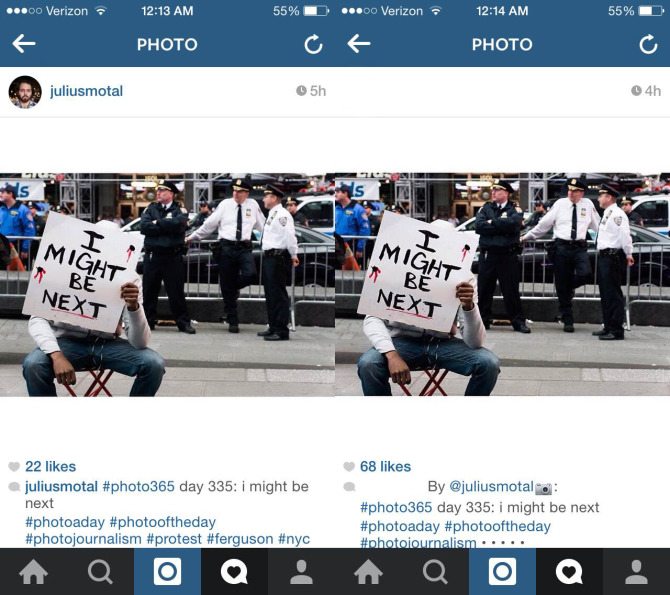Last Updated on 12/05/2014 by Julius Motal

In the course of photographing a protest in New York City, I came away with what I believed was a solid group of photographs. As I whittled the edit down to a select few, I thought I’d put some of them up on Instagram. After posting one, I got a notification that someone had posted a photo of me, which was confusing because my photo hasn’t been taken in a while. Upon going to the notifications tab, I saw that a user had reposted my photo with one of the many reposting apps available.
The problem is that I never gave her permission to do so.
She did indeed tag me in the photo caption, and it was fairly evident that it wasn’t for commercial purposes. More over, she has about 30x more followers than I do.
“That’s good exposure,” you might say.
“It is,” I’d say, “But photography isn’t a free-for-all.”
Reposting is rampant on Instagram. Some of it is sanctioned, and some of it isn’t. Those kind enough will comment with something like, “Hey, this is great. Do you mind if I repost?” If you don’t mind, you’ll agree, but if you do mind, you’ll say, “No thanks.” And hopefully, the user will respect that.
In my case, I wasn’t given such a courtesy, and so I asked her to take it down. That comment was promptly deleted, which sent a clear signal that she didn’t care. I began sifting through Instagram’s Terms of Use and Community Guidelines to find something, anything that could help.
Under “What not to do” in the Community Guidelines, it states:
-
Don’t share photos or videos that aren’t yours.
This includes other people’s posts, and/or things that you have copied or collected from the Internet. Accounts that solely consist of only this type of content may be disabled at any time.
I recognize that this may seem relatively minor in the grand scheme of things, but if I let one instance slide, I might as well let them all slide. Fortunately, Instagram has tools in place to help you if you find that your image has been reposted without your consent.
At the bottom of the Community Guidelines, you’ll find a link to Instagram’s page on copyright. In this case, the other person violated my copyright by reposting the image. At the bottom of the copyright page, you’ll find the “Reporting Copyright Infringement” link. The first option gives you the information you need to know about filing a DMCA takedown request through Instagram.
DMCA, if you don’t know, stands for Digital Millennium Copyright Act, which is a part of copyright law that makes it illegal to spread copyrighted content online without expressed permission. We’ve written about them before. You’ll have to provide basic information – name, address, email, and a business, if that’s relevant – and a link to the offending content as well as your original content. With the way the request works, your name and address will be provided to the other person. Once it’s filed, Instagram will investigate the claim and act accordingly. You can do all of this in the app, though it may be easier to navigate on your computer.
This takes a considerable amount of effort, but if principle matters to you, then you’ll go through the motions to effect this. Granted, she didn’t misrepresent my work, and she did give me credit. Yet, reposting isn’t a part of Instagram’s contract, unlike Tumblr where something will get reblogged any number of times. If it was a part of Instagram’s ecosystem, it would be built into the app, not reliant on third party applications. For Tumblr, that’s fine. That’s expected.
A serious case of reposting and misrepresenting someone’s work came with photographer Ami Vitale’s image of a girl from Guinea-Bissau, which was used in the infamous #BringBackOurGirls campaign. The problem was that her images were doctored to portray the abducted girls from Nigeria, which is dangerous for the girls photographed. You can read about that on the Lens Blog and Ochre. It’s a cautionary tale that you should keep in mind as you advance in your career.
Stand up for what’s right and for your copyright.

